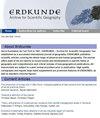世俗暴力的数字地理:一个新兴研究领域的概述和年轻人生活中(网络)欺凌的例子
IF 1.1
4区 社会学
Q3 GEOGRAPHY
引用次数: 0
摘要
本文的目的是概述“世俗暴力的数字地理”这一新兴领域,其特点是批判性和反思性地参与在纠缠的在线和离线空间中展开的中介暴力的空间性、动态和非线性时间性。超越对现有文献的传统回顾,我们应用Barad(2007: 25)的“衍射方法学”来“通读”具有纠缠在线和离线空间和空间性等非本质主义概念的暴力研究结果。鉴于各种各样的技术、暴力形式和暴力展开的空间,我们通过关注一种特定类型的基于性别的暴力来发展我们的论点:(网络)欺凌具有“丰富身份”的年轻人(Persson et al. 2020: 67),既不符合霸权异性恋和二元性别类别,也不局限于LGBTQI类别。我们讨论了数字技术在年轻人面临排他性身份政治和异性恋正常化和异性恋化的暴力过程的谈判和差异衍射中的矛盾作用。我们从自己的工作中提出了一个说明性的研究设计,它结合了对传记、家庭和社会关系以及媒体使用的回顾性见解,以及参与者主导的、移动的、部分原位的探索,这些探索涉及包容、排斥和暴力的日常混乱的中介经验、实践和谈判。因此,我们概述了在纠缠的线上和线下空间中,调解暴力背后的背景、动态、流动性、非线性和多样化的历史是如何从经验上解开的。我们展示了数字技术如何成为社会、文化和政治谈判、话语和进程的内在和纠缠的一部分,并为各种形式的暴力的正常化和日常(再)生产做出了重大贡献。本文章由计算机程序翻译,如有差异,请以英文原文为准。
Digital geographies of mundane violence: Outline of an emerging research field and the example of (cyber-)bullying in young people’s lives
The objective of this article is to outline the emerging field of the “digital geographies of mundane violence”, which is characterised by a critical and reflective engagement with the spatialities and dynamic and non-linear temporalities of mediated violence unfolding in entangled online and offline spaces. Going beyond a conventional review of existing literature, we apply Barad’s (2007: 25) “diffractive methodology” to “read through” findings of studies on violence with non-essentialist concepts of entangled online and offline space and spatiality. Given the variety of technologies, forms of violence, and spaces in which violence unfolds, we develop our argument by focusing on a specific type of gender-based violence: (cyber-)bullying of young people identifying with “abundant identities” (Persson et al. 2020: 67) that neither conform to hegemonic heterosexuality and binary gender categories nor are confined to LGBTQI categories. We discuss the ambivalent role of digital technologies in the negotiation and diffraction of difference by young people facing exclusionary identity politics and violent processes of heteronormalisation and heterosexualisation. We present an illustrative research design from our own work, which combines retrospective insights into biographies, family and social relations and media use with a participant-led, mobile, partly in-situ exploration of everyday entangled mediated experiences, practices and negotiations of inclusion, exclusion and violence. Therewith we outline how the contextualities, dynamics, fluidities, non-linearities and variegated historicities behind mediated violence in entangled online and offline spaces can be empirically unpacked. We show how digital technologies are an intrinsic and entangled part of social, cultural, and political negotiations, discourses, and processes, and contribute significantly to the normalisation and everyday (re-)production of diverse forms of violence.
求助全文
通过发布文献求助,成功后即可免费获取论文全文。
去求助
来源期刊

Erdkunde
地学-自然地理
CiteScore
2.00
自引率
7.10%
发文量
17
审稿时长
>12 weeks
期刊介绍:
Since foundation by Carl Troll in 1947, ''ERDKUNDE – Archive for Scientific Geography'' has established as a successful international journal of geography. ERDKUNDE publishes scientific articles covering the whole range of physical and human geography. The journal offers state of the art reports on recent trends and developments in specific fields of geography and comprehensive and critical reviews of new geographical publications. All manuscripts are subject to a peer-review procedure prior to publication. High quality cartography and regular large sized supplements are prominent features of ERDKUNDE, as well as standard coloured figures.
 求助内容:
求助内容: 应助结果提醒方式:
应助结果提醒方式:


